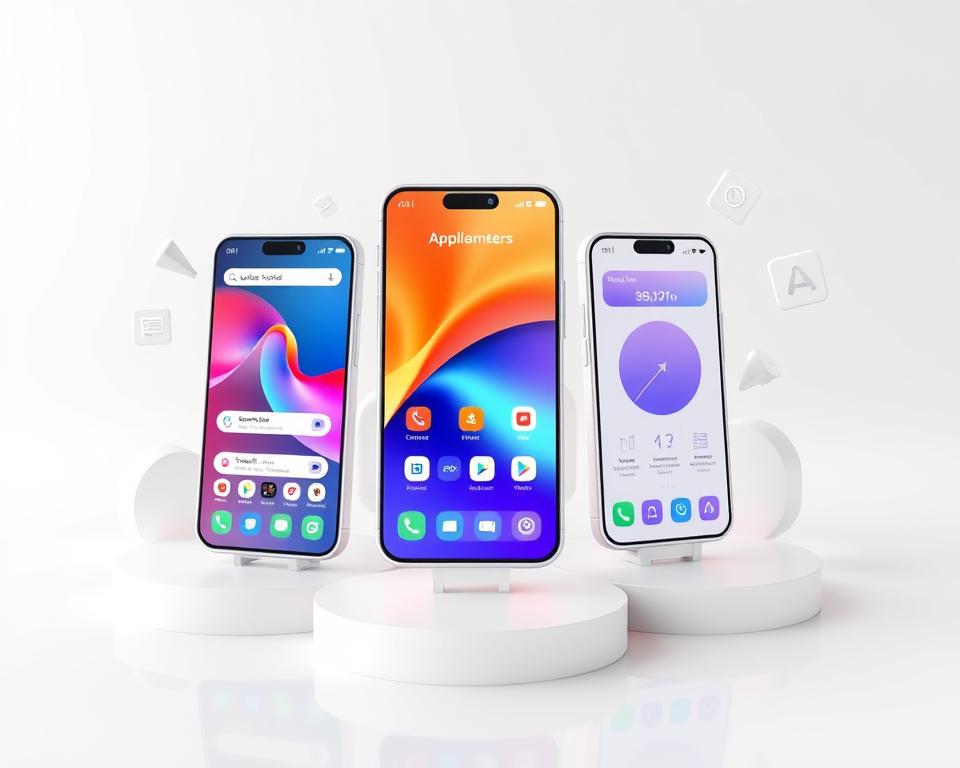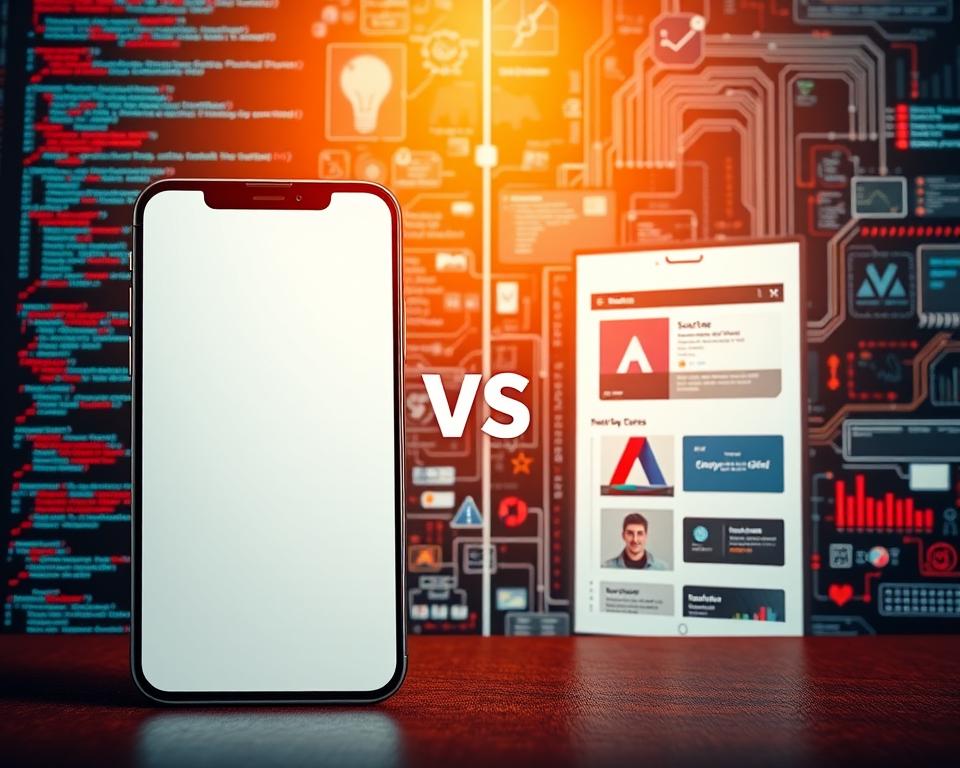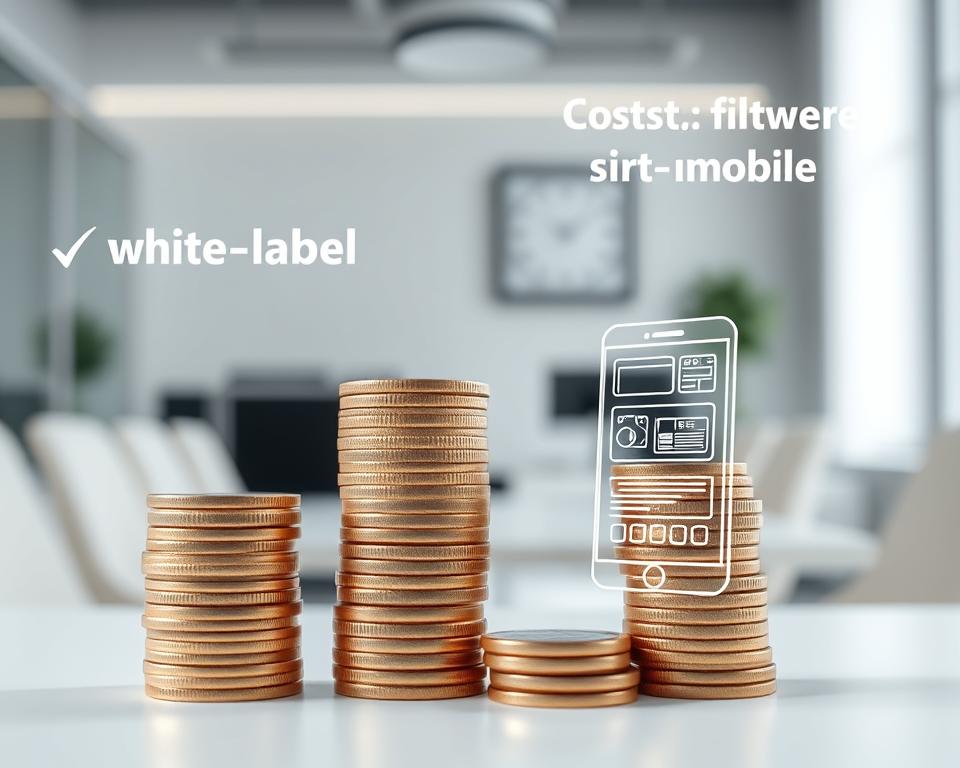In today’s market, businesses look for new ways to improve. They need to pick the right app for their needs. App development is key for business solutions. Companies debate between white-label apps and custom apps.
White-label apps are fast and affordable. But custom apps offer unique features and branding. Businesses must think about what they need before choosing. For unique solutions, custom app development can be a big help.
Table of Contents
Key Takeaways
- Understand the difference between white-label and custom apps.
- Consider your business needs and goals.
- Evaluate the benefits of custom app development.
- Assess the cost and time required for each option.
- Choose the right app solution to enhance your business operations.
Understanding App Development Options
Mobile apps are key for businesses, boosting customer experience and making operations smoother. As companies move online, knowing the app development ways is vital. This knowledge helps in making smart choices.
The Growing Importance of Mobile Apps for Businesses
Mobile apps are now a must for businesses, helping them connect better with customers and work more efficiently. Studies show that apps lead to better customer loyalty and more sales. For more on why custom apps are good for businesses, check out Next Big Technology.
Overview of Development Approaches
There are two main ways to make apps: white-label and custom. White-label apps are fast and cheap, but you can’t change them much. Custom apps are made just for you, with your own design and features. The right choice depends on what your business needs.
| Development Approach | Key Characteristics | Business Suitability |
|---|---|---|
| White-Label Apps | Quick deployment, cost-effective, limited customization | Startups, small businesses, standard service offerings |
| Custom Apps | Tailored functionality, unique design, higher development cost | Established businesses, unique business models, specialized industry requirements |
What Are White-Label Apps?
Businesses are finding white-label apps a smart choice for app development. These apps are ready-made and can be customized and sold by other companies. They offer a quick way to enter the mobile market.
Definition and Core Characteristics
White-label apps are flexible and can be tailored to fit a company’s brand. They are made by a third-party provider. This lets businesses focus on their main activities while the provider handles updates.
How White-Label Solutions Work
Using white-label apps involves picking a pre-made app, adding your brand, and sharing it with your audience. This method saves time and money compared to building an app from scratch.
Common Examples in the Market
Many big names use white-label apps to grow their online presence. For example, e-commerce companies give their customers mobile shopping apps. Fitness and wellness businesses offer apps for workouts and tracking.
Knowing about white-label apps helps businesses decide if they’re a good fit for their goals.
What Are Custom Apps?
Custom apps are made from scratch for specific business needs. They offer tailored software solutions. This boosts efficiency and user experience.
Definition and Fundamental Principles
Custom apps meet a business’s unique needs. They are flexible, scalable, and integrate with existing systems.
“The key to successful custom app development is understanding the business needs and translating them into a functional and user-friendly application.”
These principles help create apps that meet business goals and improve operations.
The Custom Development Process
The process starts with a consultation and ends with deployment. It includes:
- Requirements gathering
- Design and prototyping
- Development and testing
- Deployment and maintenance
This method ensures the app fits the business’s needs, making it more effective.
Types of Custom App Solutions
Custom app solutions vary based on business needs. Some common types are:
| Type | Description | Example |
|---|---|---|
| Enterprise Solutions | Complex apps for large organizations | ERP systems |
| E-commerce Apps | Custom shopping experiences | Personalized shopping apps |
| Industry-specific Apps | Apps tailored to specific industries | Healthcare management apps |
These solutions help businesses stand out and improve their operations.
White-Label vs Custom Apps: Which Is Right for Your Business?
When it comes to app development, knowing the difference between white-label and custom apps is crucial. Businesses need to weigh several factors before making a choice.
Key Differences at a Glance
White-label apps are pre-made solutions that can be rebranded. Custom apps, on the other hand, are made to fit specific business needs.
| Feature | White-Label Apps | Custom Apps |
|---|---|---|
| Development Approach | Pre-built, rebranded | Tailored, custom-built |
| Flexibility | Limited customization | Highly customizable |
| Cost | Generally lower upfront costs | Higher development costs |
Decision Factors Overview
Businesses should think about development costs, time-to-market, and customization required when choosing between white-label and custom apps. White-label apps are good for quick, affordable solutions. Custom apps are better for businesses that need a unique app that matches their brand.
The right choice between white-label and custom apps depends on a business’s specific needs and goals. By understanding the key differences and considering the relevant decision factors, businesses can make a choice that fits their strategy.
Pros of White-Label Apps
Companies looking into app development should know about white-label apps. They offer many benefits for businesses in today’s digital world.
Speed to Market
White-label apps can quickly hit the market. They use pre-built solutions to cut down development time. This lets businesses focus on other important tasks.
Being fast to market helps companies meet customer needs quickly. It also keeps them ahead of rivals.
Cost Efficiency
White-label apps are cost-effective. They save money because the initial work is done. This is great for startups and small businesses with tight budgets.
Reduced Technical Complexity
App development gets simpler with white-label apps. Providers take care of the tech stuff. This lets businesses focus on what they do best.
This is a big plus for companies without a lot of tech know-how.
Maintenance Simplicity
Maintenance is easy with white-label apps. Providers handle updates and upkeep. This means businesses don’t need to spend a lot on keeping their app running smoothly.
Updates and Support
Providers of white-label apps give ongoing support and updates. This keeps the app working well for users. It’s key for a good user experience and solving any problems.
Cons of White-Label Apps
White-label apps have many benefits, but they also have big drawbacks. It’s important for businesses to know these limitations before deciding on app development.
Limited Customization Options
One major issue with white-label apps is their limited customization. Businesses can’t change the app’s features or design much. This means the app might not fit the company’s brand well.
Potential Brand Differentiation Issues
White-label apps can also make it hard to stand out. Since many businesses use the same app, it can be hard to be unique. This makes it tough for companies to show who they are compared to others.
Dependency on Provider
Another big worry is relying too much on the provider. Businesses need the vendor for updates and support. If the vendor has problems, it can hurt the business.
Vendor Lock-in Concerns
It’s also hard to switch providers if needed. Changing to a new platform can be complex. This makes it hard for businesses to move if they’re not happy.
Service Discontinuation Risks
There’s a chance the provider might stop offering the service. This would leave businesses without support. It’s a big risk for those who have invested a lot in the app.
In summary, while white-label apps have some good points, their downsides are important to think about. Knowing these can help businesses make better choices for their apps.
Pros of Custom Apps
Custom apps offer businesses a lot of flexibility and control. They are made to fit a company’s specific needs. This can improve how a business runs and how it interacts with customers.
Full Control Over Features and Design
One big plus of custom apps is the control over their features and design. Businesses can focus on what matters most to their users. This makes the app more user-friendly and engaging.
Unlike white-label solutions, custom apps don’t have the same limitations. This allows for a more personalized approach to app development.
Unique User Experience
Custom apps help businesses create a user experience that matches their brand. This can make customers feel more connected to the company. It can also make them happier and more loyal.
Competitive Advantage
Investing in a custom app can give a business an edge over its competitors. It lets companies stand out by offering something unique. This can attract new customers and keep existing ones coming back.
Intellectual Property Ownership
With custom app development, businesses keep their intellectual property. They have full control over their app’s design and features. This makes it easier to update and change the app in the future.
Integration Capabilities
Custom apps can work well with other systems and tools a business uses. This makes them more useful and valuable. They can integrate with CRM systems, inventory management tools, and more.
| Benefit | Description |
|---|---|
| Full Control | Complete control over app features and design |
| Unique Experience | Tailored user experience that aligns with brand identity |
| Competitive Advantage | Innovative differentiation from competitors |
Cons of Custom Apps
Creating custom apps comes with its own set of challenges. These include higher costs and longer timelines. It’s important to know the potential downsides before diving in.
Higher Development Costs
One major drawback is the high cost of making a custom app. It takes a lot of money for design, development, and testing. A Gartner study found that the cost can range from $50,000 to $500,000 or more, based on complexity and features.
Longer Time to Market
Custom apps take longer to make and launch than off-the-shelf solutions. This delay can be a problem in fast-paced markets where speed is key. As noted by
“The time it takes to develop a custom app can be a significant barrier for businesses looking to quickly capitalize on market opportunities.” –
Ongoing Maintenance Requirements
Custom apps need regular updates and bug fixes to stay functional and secure. This ongoing work adds to the app’s total cost. A Forrester report shows that maintenance can cost up to 20% of the initial cost each year.
Technical Debt Considerations
Technical debt is the cost of quick fixes that need to be fixed later. In custom app development, it can pile up if not managed well. It’s key to focus on clean code and solid architecture to avoid this.
Resource Allocation Challenges
Building custom apps needs a lot of resources, like skilled developers and designers. Finding and using these resources well can be hard, especially for small budgets. Good resource management is crucial for app success.
| Aspect | Custom Apps | White-Label Apps |
|---|---|---|
| Development Cost | Higher ($50,000 – $500,000+) | Lower ($10,000 – $50,000) |
| Time to Market | Longer (Several months to years) | Shorter (Few weeks to months) |
| Maintenance | Ongoing, significant resources required | Generally handled by the provider |
Cost Comparison: White-Label vs Custom Development
When looking at app development, it’s key to know the costs of white-label versus custom solutions. Businesses need to look at both the upfront costs and the long-term expenses. This helps them make a smart choice.
Initial Investment Analysis
White-label apps cost less at first than custom apps. This is because white-label apps are already made, saving on development costs. Custom apps, however, are made just for your business. They cost more upfront because they need more work in design, development, and testing.
| Development Approach | Initial Cost | Development Time |
|---|---|---|
| White-Label | $10,000 – $50,000 | 2-6 months |
| Custom Development | $50,000 – $500,000+ | 6-18 months |
Long-term Cost Considerations
White-label apps might be cheaper at first, but their long-term costs can pile up. This is especially true if you need to change or grow the app. Custom apps, though expensive at first, can save money in the long run. They’re made just for your business, so you might not need to make big changes later.
ROI Expectations
Return on Investment (ROI) is important when choosing between white-label and custom apps. Custom apps can give a better ROI if they really improve how users interact with your app and your business processes. White-label apps, while they can get to market faster, might have a smaller ROI. This is because they’re more general and might not be as customizable.
In conclusion, businesses should think carefully about their needs and budget when choosing between white-label and custom app development. Knowing the costs of each option is crucial for making a choice that fits their goals.
Timeline Considerations for Both Options
When thinking about app development, the timeline is key. It affects how fast you can start using the app. This speed is important for your business plans.
White-Label Implementation Timeline
White-label apps are quicker to set up. They can be ready in just a few weeks. This is because their basic parts are already made.
Custom Development Timeline
Custom apps take longer to make. The custom development timeline can be months or even a year. This depends on how complex the app is.
Development Phases
The custom app making process has several steps:
- Planning and analysis
- Design
- Development
- Testing
Testing and Deployment
After making the app, it needs to be tested. This makes sure it works well. Then, it’s ready to be released on app stores. For more on choosing between white-label and custom apps, check out our guide on custom app vs white-label app development.
Business Scenarios Ideal for White-Label Apps
In today’s fast world, white-label apps are a quick way to start mobile services. They are great for situations where speed, cost, and efficiency matter most.
Startups and Small Businesses
Startups and small businesses find white-label apps a budget-friendly way to enter the mobile market. They can’t afford the high costs of custom app development. White-label apps help them quickly get a mobile presence, competing with big companies.
John Doe, CEO of a successful startup, says, “White-label apps helped us launch a mobile service without spending a lot.”
Testing Market Viability
White-label apps are perfect for testing if a mobile app will work in the market. Companies can see how users react and get feedback without a big investment. This way, they can make changes based on real user data.
Standard Service Offerings
For businesses with standard services, white-label apps are a simple and effective solution. For example, a delivery service can use a white-label app for managing orders and logistics. This improves customer experience without needing a lot of customization.
As the market keeps changing, white-label apps’ flexibility and speed will keep being a big plus for businesses wanting to grow and succeed.
Business Scenarios Ideal for Custom Apps
For businesses with unique models or specific needs, custom apps are a great choice. They offer the flexibility and detail needed for complex business needs.
Unique Business Models
Companies with new or different business models really benefit from custom apps. These apps can handle special workflows and features not found in standard apps. For example, Next Big Technology excels in creating custom e-commerce apps, showing the need for unique digital solutions.
Specialized Industry Requirements
Some industries need apps that meet specific rules. For instance, healthcare apps must follow HIPAA, and financial apps need top security. Custom apps can be made to meet these needs, ensuring they are safe and follow the rules.
Scaling Established Businesses
Big businesses wanting to grow can also use custom apps. These apps can work with current systems, grow with the business, and offer key features for expansion. A well-made custom app can help businesses reach more customers.
| Business Scenario | Benefits of Custom Apps |
|---|---|
| Unique Business Models | Tailored solutions, specific workflows, and integrations |
| Specialized Industry Requirements | Compliance with regulations, enhanced security |
| Scaling Established Businesses | Integration with existing systems, scalability, and growth support |
Implementation Strategies and Best Practices
Getting an app up and running needs careful planning and smart choices. Whether you pick a white-label or custom app, knowing how to implement it is key to success.
White-Label Implementation Tips
When setting up white-label apps, focus on a few important things. These include picking the right vendor and how to brand your app.
Vendor Selection Criteria
Choosing the right vendor is crucial for a white-label app’s success. Look at these factors when picking a vendor:
- Reliability and reputation in the market
- Quality of customer support and service level agreements
- Customization options available within the white-label solution
- Scalability of the platform to meet future needs
For more on how custom mobile app development can help your business, check out Next Big Technology.
Branding and Customization Approaches
To make your app truly yours, use the customization options of the white-label solution. This means:
- Tailoring the app’s UI/UX to match your brand identity
- Integrating your brand’s messaging and visual elements
- Utilizing available customization features to differentiate your app
Custom App Development Management
Managing custom app projects is different. It focuses on working with development teams and ensuring quality.
Working with Development Teams
Working well with development teams is key for custom app success. Important strategies include:
- Clearly defining project requirements and expectations
- Establishing regular communication channels and update mechanisms
- Fostering a collaborative environment to encourage innovation
Quality Assurance Processes
Quality assurance is vital to ensure your custom app meets standards and works as expected. This includes:
- Thorough testing across various devices and platforms
- Conducting user acceptance testing (UAT) to validate functionality
- Iterating based on feedback to refine the app
By following these strategies and best practices, businesses can boost their chances of success in app development. This applies whether they choose white-label or custom app solutions.
Hybrid Approaches: Getting the Best of Both Worlds
Businesses are now looking at hybrid approaches for their apps. They mix white-label and custom apps to get the best. This way, they create apps that fit their needs perfectly.
Customizing White-Label Solutions
One smart move is to customize white-label apps. Start with a basic app and then add your own touches. This saves time and money compared to making a new app.
For example, a company might tweak a white-label e-commerce app. They could change the look, add special payment options, or unique features. A survey found that this method boosted user engagement by 30%.
Phased Development Strategies
Another strategy is phased development. First, launch a basic app to get into the market fast. Then, add more features over time. This lets businesses test their ideas and plan for future updates.
Take a fintech company that started with a basic mobile banking app. They later added cool features like personal finance insights and better security. This move kept 25% more customers.
| Hybrid Approach | Key Benefits | Example Use Case |
|---|---|---|
| Customizing White-Label | Reduced development time, cost-effective, brand alignment | E-commerce app with customized UI/UX and payment gateways |
| Phased Development | Quick market entry, validation of app concept, long-term scalability | Fintech mobile banking app with subsequent custom feature additions |
For more on app development, including hybrid methods, check out Next Big Technology.
Future Trends in App Development Solutions
The future of app development is changing fast. New tools and technologies are leading the way. Businesses are using mobile apps more to connect with customers and run their operations. It’s important to keep up with these trends to stay competitive.
Evolving White-Label Platforms
White-label app platforms are getting better. They offer more ways to customize and integrate apps. This makes them great for businesses that need apps fast but still want to keep their brand.
Advances in Custom Development Tools
Custom app development is also improving. New tools and methods are making it faster and cheaper. This means more businesses can afford to create custom apps.
Impact of Emerging Technologies
New technologies like AI, machine learning, and low-code solutions are changing app development. They make apps smarter and easier to build. This is good for businesses and users alike.
AI and Machine Learning Integration
AI and machine learning are making apps more intelligent. They can understand user behavior and predict needs. This adds a lot of value to businesses.
Low-Code and No-Code Solutions
Low-code and no-code platforms are making app development more accessible. Even those without coding skills can build apps. This opens up new opportunities for businesses to innovate and adapt.
Conclusion
Choosing between white-label and custom apps depends on several factors. These include your business goals, budget, and future plans. White-label apps are cheaper and faster to set up. On the other hand, custom apps offer more control and can grow with your business.
It’s important to think about what your business needs when making this choice. If you need something fast, white-label might be the way to go. But if you want something unique and tailored to your brand, custom apps are better.
To get a better understanding of both options, check out daily.dev. They have a detailed comparison. Knowing the differences between white-label and custom apps can help your business succeed in the competitive app market.



















